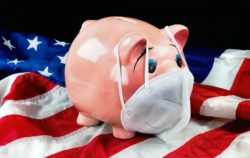Top Class Actions’s website and social media posts use affiliate links. If you make a purchase using such links, we may receive a commission, but it will not result in any additional charges to you. Please review our Affiliate Link Disclosure for more information.
Since the coronavirus hit the U.S. back in March—more than six months ago now—it has changed countless aspects of our daily lives. People are out of work, kids are either staying home from school or going back to a very different learning environment, many have lost healthcare, and over 230,000 Americans have died from COVID-19.
Another major concern related to the coronavirus? The economy, and how coronavirus is affecting the stock market and, potentially, the resulting coronavirus financial impact.
What Was the Initial Coronavirus Financial Impact?
In the initial wave of U.S. COVID-19 cases in March, the stock market unsurprisingly took a major hit. The Dow Jones index dropped drastically through the first half of the month, and took another 12.9% dip after Trump admitted that the U.S. “may be” headed for a recession.
Notably, the 12.9% drop was the worst Dow Jones drop since 1987.
Other indexes showed a steep slide too, with the S&P 500 down 11.9% and Nasdaq down 12.3%, taking all three indexes to more than 25% below their highs. Within about six weeks, the Dow and the S&P 500 each fell a total of about 35%, “the fastest-ever fall from record levels into a bear market,” according to the Wall Street Journal.
Why Did the Stock Market Rebound?
Although the initial hit to the stock market was significant, the recovery after the drop was surprising. The U.S. quickly cut interest rates to nearly zero and launched a stimulus program to help bolster the economy. This move was made in coordination with other major countries, including the U.K., Japan, Canada, and Switzerland.
But within six months, by mid-September, the U.S. stock markets had regrouped and even begun to flourish. The Dow is once again near the all-time high it hit in February, before the crash, and the S&P 500 has seen the best recovery in more than 80 years. Indeed, it took just 126 trading days for this recovery, whereas previous downturns took an average of about six years to recover from.
So with how coronavirus is affecting the stock market, how was this recovery possible?
A key factor was the stimulus program from the Federal Reserve and U.S. government, which cut interest rates and concentrated on lending billions of dollars across markets. The program also funded stimulus checks for more than 150 million Americans and backed about half a trillion dollars in small business loans to help with the coronavirus economic impact.
Another factor is the general public belief that the coronavirus is a problem with an end in sight, and that the U.S. economy will inevitably bounce back.
The coronavirus economic impact was also stymied by certain companies that actually saw shares increase dramatically—tech giants like Apple, Amazon, Microsoft, and more, which are uniquely suited to flourish during the inevitable societal impacts of the ongoing pandemic.
 How Coronavirus is Affecting the Stock Market Today
How Coronavirus is Affecting the Stock Market Today
More than eight months into the pandemic crisis, many may be wondering how coronavirus is affecting the stock market today, after it initially tanked.
The stock market had reached a similar level as where it was prior to the March crash, but that does not mean the stock market—or the economy at large—have fully recovered. Since the beginning of September, the Dow has decreased steadily (if only slightly), and Nasdaq has dropped by more than 10% since Sept. 2.
How Does the Stock Market Rebound Compare to the Coronavirus Economic Impact?
But the coronavirus economic impact is more than the impact of coronavirus on stock market fluctuation. One of the major signs of economic struggle is the unemployment rate, which was impacted in several major countries. In Japan, unemployment only increased by 0.6% from 2019 to 2020, Germany by 0.7%, and the U.K. by 1%. Canada’s and France’s unemployment increased by nearly 2% each, and Italy’s by nearly 3%.
The U.S. unemployment rate took the worst hit, increasing from 3.8% to a whopping 13.0% in May (though it reached 14.4% in April). By the numbers, this meant that unemployment shot up from 6.2 million unemployed Americans in February to 20.5 million unemployed in May. This was a substantially greater increase in unemployment than that of the Great Recession, which saw unemployed Americans increase by 8.8 million, peaking at 10.6% in Jan. 2010.
Another measure of the coronavirus economic impact is looking at businesses themselves. New data indicates that about 60% of the businesses that closed due to the COVID-19 pandemic will never reopen. Restaurants were some of those hit the hardest, followed by retail establishments.
Stock Market Tumbles as Pandemic Drags On
How the coronavirus is affecting the stock market continues to be a moving target as COVID-19 appears to be surging across the country into the fall and winter of 2020. Investor’s Business Daily reports that the stock market too heavy hits in late October.
Experts attribute the decline to continuing coronavirus fears. CNBC reports that coronavirus infections are surging in nearly every nation, affecting world markets. As European markets fell during the last week of October 2020, American markets followed suit. CNBC reports that the Dow Jones Industrial Average fell over 900 points on Oct. 27, 2020 – the largest drop since mid-June.
According to Jim Cramer, a CNBC investing expert, the drop can be attributed to a lack of action on the part of policymakers.
“The lockdowns without the stimulus equals what we’re seeing,” stated Cramer. “The lockdowns without the stimulus equals what we’re seeing.”
MarketWatch reports that the continuing rise in coronavirus cases took investors by surprise in the fall. Experts told reporters that investors likely thought that, with COVID-19 rates declining in the summer, cases would continue to fall or, at least, remain stable; however, it appears that the surge in cases is giving investors pause.
Experts also note other factors, such as uncertainty surrounding the upcoming U.S. election, the lack of a coronavirus vaccine, and unchanged behavior driving COVID-19 cases higher, may have also affected the market, according to MarketWatch.
Free Coronavirus Financial Impact Claim Evaluation
If you followed the advice of a financial advisor during the COVID-19 pandemic and lost money as a result, you may be eligible to file a coronavirus financial impact lawsuit and seek compensation for your losses.
ATTORNEY ADVERTISING
Top Class Actions is a Proud Member of the American Bar Association
LEGAL INFORMATION IS NOT LEGAL ADVICE
Top Class Actions Legal Statement
©2008 – 2024 Top Class Actions® LLC
Various Trademarks held by their respective owners
This website is not intended for viewing or usage by European Union citizens.


 How Coronavirus is Affecting the Stock Market Today
How Coronavirus is Affecting the Stock Market Today












